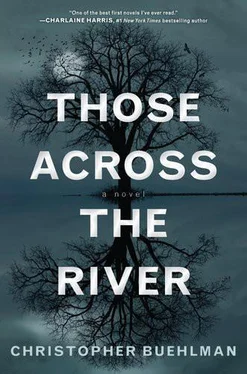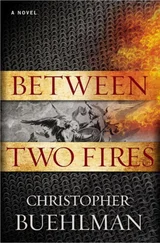The people in the hot hall were glad to laugh. This town liked its mayor, and those who wanted the Chase stopped felt their cause swell; as he sat back down, applause still rippled through the room.
Next up was Lester Gordeau, but as he took the podium Old Man Gordeau shouted, “Sit down, boy! Before I give you the wire end of the brush!” and got another spasm of laughter.
Lester did not laugh. His Adam’s apple bobbed and he did not look up much as he spoke. He said, “I think we should keep the Chase because we always had it. It was ours as long as I can remember, and I don’t think no other place had it even once. I mean, Morgan’s always been a bigger town and they ain’t got it. I know it costs and times is hard, but I’ll keep givin what I can if others will. I mean, the mill town ain’t even got it.”
His father could not resist speaking out of turn again, and he said, “Know what they got in the mill town that we ain’t got? Pork chops!”
The hall boomed with laughter and Lester sat down abashed.
A small but distinct sound of surprise rose from the gathering when Martin Cranmer was called to the podium. He came in from my left, pushing his way in from the yard, mumbling what looked like “Excuse me” through his beard, and then he stood and looked at the people for a long time before he spoke.
He was wearing the same tight, pale yellow suit he wore to the Social. His hard hands gripped the sides of the podium so the knuckles were white, but his face was calm. I was sure he was drunk in that way that only career drinkers get; he seemed sober, but his eyes shone as if he had a secret and exclusive communion with the wellspring of all knowledge.
Martin said, “I know a lot of you don’t like me and that’s fine because I only like a few of you. I hunt things in the woods and I stuff them and I sell them. Some of you good Christians buy another product I sell in jars because I run it through twice for good measure, I charge the thump keg just right, and you know I don’t cut it with embalming fluid like MacLeish did before you ran him out of town. Some of you trade me the yeast or corn or sugar I need, but other than that I don’t need people. If you all disappeared tomorrow I would be as happy as the man in the moon.”
“Get to the point,” someone said from the back, not yelling, but loud enough to be heard.
“My point, without putting too fine a point on it, is that marching those pigs out into the woods is the most intelligent thing you people do. Every month I watch a couple of young men go by my house and to the river with the pigs. I watch the fellows take that little ferry off the rocks and load the animals on and pull them across the river and let them go. And sometimes, just sometimes, I hear squealing.”
Now they were listening.
“Have any of you ever seen a pig running around loose in those woods?”
Nobody spoke.
“Lester, you fish that river. Have you ever seen one of those pigs?”
Lester shook his head in a gesture that was barely visible.
“So my point is that something, or someone, or something who is someone is making a meal of those swine. And if you stop sending them, do you think it is possible that your pig-eater, or pigeaters, might decide to come to town for supper?”
“You’re eating those goddamn pigs!” Buster Simms shouted. The people laughed.
“You are wrong,” Martin said. “I do not eat the flesh of pigs, and neither do I eat carrion, although I have been known to put straw up its ass. I have become a Moslem. And if any of you holy heathens would like to hear the true gospel of the prophet Mohammed, I will be happy to testify while wearing the outfit that is traditional to the whirling dervish.”
“Your time’s up. Now git off the damn podium,” Estel Blake said.
Martin put his hands over his chest, performed a Moslem bow, and then left, squeezing past frowning townsfolk. He stumbled and nearly fell when he reached the door, then disappeared outside.
Paul, who was an aldermen as well as owner of the general store, read from the sign-up sheet and saw that he was next to speak. He pulled at where his tie pinched his neck and stood before the crowd, saying, “I’m with Gordeau senior. Seems to me we been wastin a lot a pig flesh. Two pigs a month don’t sound like much, less it’s your turn to give em up. I know our folks took the pigs out startin in olden days, but our folks also rode horses or mules and none of them had the electric lights, which a few of our businesses have, and our houses will soon. These are new times. Lot of you been payin me on credit til times get better. Well, times ain’t better. Some of you ain’t paid me in a year. Still, nobody owes me as much as one healthy breed sow would fetch at market. The Good Book says, ‘Render under Caesar.’ Seems to me a man ought to pay his worldly debts first. Thank you.”
And so it continued into the night. Miles Falmouth stood for continuing the tithe of pigs, and his words carried weight since he was the last one to lose livestock. He also went off on a tirade about how squatters had been coming into town now and again, and how they were likely the ones eating the pigs since they had no professions and could not be trusted. Ursie Noble stood up and said that she liked plaiting flowers for the pigs, and that since she did not have much that was fun to do, she would hate to give it up.
Around ten o’clock Pastor Lyndon gave a long and rousing sermon using the story of Isaac and Abraham as a centerpiece, repeating the refrain, “If the Lord God desires it, it shall be done!” until he got even some of those from the other side riled up. Old Man Gordeau actually raised his hand before speaking out of turn this time, and said, “Forgive me Pastor, but I read the Good Book cover to cover and I don’t remember no mention of leading pigs into the nettles with flowers around their neck.”
Pastor Lyndon said, “And neither did you read about the town of Whitbrow. Yet you did read about sacrifice. Do you believe, Brother Gordeau, that sacrifice was meant only for the children of Israel? The Lord has made manifest His desire for the Chase of Pigs through tradition. We were not present when the Lord made creation, nor were we of an age to question when our grandfathers saw fit to lead the first pigs away. Will we call them fools that nursed us and nursed our mothers? Will we now walk over their graves to put meat on our plate? We should thank the Lord for letting the choice between Him and Mammon stand so clearly before us.”
Anna Muncie, the teacher of the younger grades, had the unpleasant task of following Pastor Lyndon. She said, “I am just as right with Jesus as anyone here. Yet I think we are doing our children a disservice to raise them in the shadow of such an ignorant tradition as this. My late husband had been to Spain before we married, and he told me all about bullfights. That is also an ignorant tradition, although he allowed that he quite enjoyed them. Now, we have no control over what the Spanish do in Spain, but we have control over our own actions. I try to tell the kids about the marvels of the modern world and flight and medicine and all that, but then we stand around and let little girls decorate pigs we should be eating and shoo those pigs away for no good reason. Help me to help our kids not be savages. Thank you.”
Old Man Gordeau called Eudora Nichols as the final speaker of the evening, noting that the meeting would reconvene the next night for others who wished to have their say before the aldermen voted.
She captivated them.
I watched her do it.
If the men wanted to hate her for being a woman or a Yankee, her beauty soothed them and her reason made them listen. If the women resented her beauty, then the kindness in her voice made them forgive her for it. The kindness told them that she would never try to turn their husbands, that she would never look down her nose at them if they were plain, nor envy them if they, too, were cleverly made.
Читать дальше












